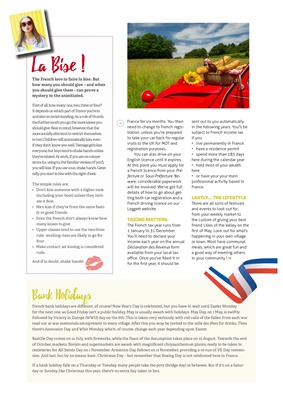
France for six months. You then
need to change to French registration,
unless you're prepared
to take your car back for regular
visits to the UK for MOT and
registration purposes.
You can also drive on your
English licence until it expires.
At this point you must apply for
a French licence from your Préfecture
or Sous-Préfecture. Beware:
considerable paperwork
will be involved. We've got full
details of how to go about getting both car registration
and a
French driving licence on our
Leggett website.
TAXING MATTERS
The French tax year runs from
1 January to 31 December.
You'll need to declare your
income each year on the annual
Déclaration des Revenus form
available from your local tax
office. Once you've filled it in
for the first year, it should be
sent out to you automatically
in the following years. You'll be
subject to French income tax
if you:
• live permanently in France
• have a residence permit
• spend more than 183 days
here during the calendar year
• hold most of your wealth
here
• or have your your main
professional activity based in
France
LASTLY... THE LIFESTYLE
There are all sorts of festivals
and events to look out for,
from your weekly market to
the custom of giving your best
friend Lilies of the Valley on the
first of May. Look out for what's
happening in your own village
or town. Most have communal
meals, which are great fun and
a good way of meeting others
in your community !
The French love to faire la bise. But
how many you should give - and when
you should give them - can prove a
mystery to the uninitiated.
First of all, how many: one, two, three or four?
It depends on which part of France you're in
and also on social standing. As a rule of thumb,
the further south you go, the more kisses you
should give. Bear in mind, however, that the
more socially elite tend to restrict themselves
to two. Children will automatically kiss, even
if they don't know you well. Teenage girls kiss
everyone, but boys tend to shake hands unless
they're related. At work, if you are on tutoyer
terms (i.e. using tu, the familiar version of 'you'),
you will kiss. If you use vous, shake hands. Generally,
you start la bise with the right cheek.
The simple rules are:
• Don't kiss someone with a higher rank
(including your boss) unless they initi ate
it first
• Men kiss if they're from the same fami-
ly or good friends
• Even the French don't always know how
many kisses to give
• Upper classes tend to use the two-bises
rule; working class are likely to go for
four
• Make contact: air kissing is considered
rude
And if in doubt, shake hands!
La Bise !
Bank HolidaysFrench bank holidays are different, of course! New Year's Day is celebrated, but you have to wait until Easter Monday
for the next one, as Good Friday isn't a public holiday. May is usually awash with holidays: May Day, on 1 May, is swiftly
followed by Victory in Europe (WWII) day on the 8th. This is taken very seriously, with roll calls of the fallen from each war
read out at war memorials omnipresent in every village. After this you may be invited to the salle des fêtes for drinks. Then
there's Ascension Day and Whit Monday, which, of course, change each year depending upon Easter.
Bastille Day comes on 14 July, with fireworks, while the Feast of the Assumption takes place on 15 August. Towards the end
of October, markets, florists and supermarkets are awash with magnificent chrysanthemum plants, ready to be taken to
cemeteries for All Saints Day on 1 November. Armistice Day follows on 11 November, providing a re-run of VE Day ceremonies.
And last, but by no means least, Christmas Day - but remember that Boxing Day is not celebrated here in France.
If a bank holiday falls on a Thursday or Tuesday, many people take the pont (bridge day) in between. But if it's on a Saturday
or Sunday, like Christmas this year, there's no extra day taken in lieu.